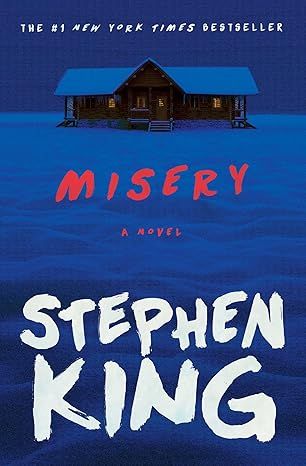Misery: A NovelKindle
4.7
-
16,227 ratings
The #1 New York Times bestseller about a famous novelist held hostage in a remote location by his “number one fan.” One of “Stephen King’s best…genuinely scary” (USA TODAY).
Paul Sheldon is a bestselling novelist who has finally met his number one fan. Her name is Annie Wilkes, and she is more than a rabid reader—she is Paul’s nurse, tending his shattered body after an automobile accident. But she is also furious that the author has killed off her favorite character in his latest book. Annie becomes his captor, keeping him prisoner in her isolated house.
Annie wants Paul to write a book that brings Misery back to life—just for her. She has a lot of ways to spur him on. One is a needle. Another is an axe. And if they don’t work, she can get really nasty.
“Terrifying” (San Francisco Chronicle), “dazzlingly well-written” (The Indianapolis Star), and “truly gripping” (Publishers Weekly), Misery is “classic Stephen King...full of twists and turns and mounting suspense” (The Boston Globe).
Kindle
$9.99
Available instantly
Audiobook
$0.00
with membership trial
Library Binding
$19.05
Paperback
$13.27
Ships from
Amazon.com
Payment
Secure transaction
ISBN-10
1501143107
ISBN-13
978-1501143106
Print length
368 pages
Language
English
Publisher
Scribner
Publication date
January 04, 2016
Dimensions
5.5 x 1 x 8.38 inches
Item weight
11.5 ounces
Popular Highlights in this book
It was a famous old hotel called the Overlook. It burned down ten years ago. The caretaker burned it down. He was crazy. Everybody in town said so. But never mind; he’s dead.
Highlighted by 893 Kindle readers
Listening to Annie was like listening to a song played in the wrong key.
Highlighted by 619 Kindle readers
In the dark, rationality seemed stupid and logic a dream. In the dark he thought with his skin.
Highlighted by 499 Kindle readers
Product details
ASIN :
B018ER7K76
File size :
2481 KB
Text-to-speech :
Enabled
Screen reader :
Supported
Enhanced typesetting :
Enabled
X-Ray :
Enabled
Word wise :
Enabled
Editorial reviews
“King at his best...a winner.” ― The New York Times
“Undiluted horror…wonderful…A primal storyteller writing about a primal scream.�” ― Houston Chronicle
"Suspenseful, entertaining, genuinely scary.” ― USA Today
“Nerve-jangling…razor keen.” ― Kirkus Reviews
“Solid character delineation and terrifying insight. In addition to being able to scare the reader breathless, King says a tremendous amount about writing itself. We delight in his virtuosity.” ― The Washington Post
“Dazzlingly well-written.” ― The Indianapolis Star
“Terrifying…King is a terrific storyteller.” ― San Francisco Chronicle
"Classic King...full of twists and turns and mounting suspense." ― Boston Globe
“Page-turningly effective, stringing out every scene to the screaming point.” ― Chicago Sun-Times
“Stephen King at his best…frighteningly good.” ― Philadelphia Inquirer
“Vintage King…a masterpiece of horror…creates a level of tension that makes it difficult to keep your eyes from jumping to the next page to escape sooner.” ― Cincinnati Post
“Deft psychological horror…easily one of King’s best novels.” ― The Boston Herald
“Unadulteratedly terrifying.” ― Publishers Weekly
“As is his genius, King never relaxes the oh-my-god tension until the final paragraph.” ― San Diego Tribune
“Compelling…totally involving.” ― Library Journal
“Misery had me on edge for days after I’d finished it… the novel is something else — an airless, claustrophobic portrait of an egotistic writer pushed to the edge of madness by pain, pills,incarceration, the expectations of his reading public and a deadline like he’s never known before. In the book, our hero is as threatened by the demons within as he is by the madwoman beside his bed. Like him, you the reader can’t wait to escape; yet you can no more walk away from Mr. King’s tightly spun yarn than Paul can walk away from his captor.” ― The New York Times
Read more
Sample
I
ANNIE
When you look into the abyss, the abyss also looks into you.
—FRIEDRICH NIETZSCHE
1
umber whunnnn yerrrnnn umber whunnnn fayunnnn These sounds: even in the haze.
2
But sometimes the sounds—like the pain—faded, and then there was only the haze. He remembered darkness: solid darkness had come before the haze. Did that mean he was making progress? Let there be light (even of the hazy variety), and the light was good, and so on and so on? Had those sounds existed in the darkness? He didn’t know the answers to any of these questions. Did it make sense to ask them? He didn’t know the answer to that one, either.
The pain was somewhere below the sounds. The pain was east of the sun and south of his ears. That was all he did know.
For some length of time that seemed very long (and so was, since the pain and the stormy haze were the only two things which existed) those sounds were the only outer reality. He had no idea who he was or where he was and cared to know neither. He wished he was dead, but through the pain-soaked haze that filled his mind like a summer storm-cloud, he did not know he wished it.
As time passed, he became aware that there were periods of nonpain, and that these had a cyclic quality. And for the first time since emerging from the total blackness which had prologued the haze, he had a thought which existed apart from whatever his current situation was. This thought was of a broken-off piling which had jutted from the sand at Revere Beach. His mother and father had taken him to Revere Beach often when he was a kid, and he had always insisted that they spread their blanket where he could keep an eye on that piling, which looked to him like the single jutting fang of a buried monster. He liked to sit and watch the water come up until it covered the piling. Then, hours later, after the sandwiches and potato salad had been eaten, after the last few drops of Kool-Aid had been coaxed from his father’s big thermos, just before his mother said it was time to pack up and start home, the top of the rotted piling would begin to show again—just a peek and flash between the incoming waves at first, then more and more. By the time their trash was stashed in the big drum with KEEP YOUR BEACH CLEAN stencilled on the side, Paulie’s beach-toys picked up
(that’s my name Paulie I’m Paulie and tonight ma’ll put Johnson’s Baby Oil on my sunburn he thought inside the thunderhead where he now lived) and the blanket folded again, the piling had almost wholly reappeared, its blackish, slime-smoothed sides surrounded by sudsy scuds of foam. It was the tide, his father had tried to explain, but he had always known it was the piling. The tide came and went; the piling stayed. It was just that sometimes you couldn’t see it. Without the piling, there was no tide.
This memory circled and circled, maddening, like a sluggish fly. He groped for whatever it might mean, but for a long time the sounds interrupted.
fayunnnn
red everrrrrythinggg
umberrrrr whunnnn
Sometimes the sounds stopped. Sometimes he stopped.
His first really clear memory of this now, the now outside the storm-haze, was of stopping, of being suddenly aware he just couldn’t pull another breath, and that was all right, that was good, that was in fact just peachy-keen; he could take a certain level of pain but enough was enough and he was glad to be getting out of the game.
Then there was a mouth clamped over his, a mouth which was unmistakably a woman’s mouth in spite of its hard spitless lips, and the wind from this woman’s mouth blew into his own mouth and down his throat, puffing his lungs, and when the lips were pulled back he smelled his warder for the first time, smelled her on the outrush of the breath she had forced into him the way a man might force a part of himself into an unwilling woman, a dreadful mixed stench of vanilla cookies and chocolate ice cream and chicken gravy and peanut-butter fudge.
He heard a voice screaming, “Breathe, goddammit! Breathe, Paul!”
The lips clamped down again. The breath blew down his throat again. Blew down it like the dank suck of wind which follows a fast subway train, pulling sheets of newspaper and candy-wrappers after it, and the lips were withdrawn, and he thought For Christ’s sake don’t let any of it out through your nose but he couldn’t help it and oh that stink, that stink that fucking STINK.
“Breathe, goddam you!” the unseen voice shrieked, and he thought I will, anything, please just don’t do that anymore, don’t infect me anymore, and he tried, but before he could really get started her lips were clamped over his again, lips as dry and dead as strips of salted leather, and she raped him full of her air again.
When she took her lips away this time he did not let her breath out but pushed it and whooped in a gigantic breath of his own. Shoved it out. Waited for his unseen chest to go up again on its own, as it had been doing his whole life without any help from him. When it didn’t, he gave another giant whooping gasp, and then he was breathing again on his own, and doing it as fast as he could to flush the smell and taste of her out of him.
Normal air had never tasted so fine.
He began to fade back into the haze again, but before the dimming world was gone entirely, he heard the woman’s voice mutter: “Whew! That was a close one!”
Not close enough, he thought, and fell asleep.
He dreamed of the piling, so real he felt he could almost reach out and slide his palm over its green-black fissured curve.
When he came back to his former state of semiconsciousness, he was able to make the connection between the piling and his current situation—it seemed to float into his hand. The pain wasn’t tidal. That was the lesson of the dream which was really a memory. The pain only appeared to come and go. The pain was like the piling, sometimes covered and sometimes visible, but always there. When the pain wasn’t harrying him through the deep stone grayness of his cloud, he was dumbly grateful, but he was no longer fooled—it was still there, waiting to return. And there was not just one piling but two; the pain was the pilings, and part of him knew for a long time before most of his mind had knowledge of knowing that the shattered pilings were his own shattered legs.
But it was still a long time before he was finally able to break the dried scum of saliva that had glued his lips together and croak out “Where am I?” to the woman who sat by his bed with a book in her hands. The name of the man who had written the book was Paul Sheldon. He recognized it as his own with no surprise.
“Sidewinder, Colorado,” she said when he was finally able to ask the question. “My name is Annie Wilkes. And I am—”
“I know,” he said. “You’re my number-one fan.”
“Yes,” she said, smiling. “That’s just what I am.”
3
Darkness. Then the pain and the haze. Then the awareness that, although the pain was constant, it was sometimes buried by an uneasy compromise which he supposed was relief. The first real memory: stopping, and being raped back into life by the woman’s stinking breath.
Next real memory: her fingers pushing something into his mouth at regular intervals, something like Contac capsules, only since there was no water they only sat in his mouth and when they melted there was an incredibly bitter taste that was a little like the taste of aspirin. It would have been good to spit that bitter taste out, but he knew better than to do it. Because it was that bitter taste which brought the high tide in over the piling
(PILINGS it’s PILINGS there are Two okay there are two fine now just hush just you know hush shhhhhh)
and made it seem gone for awhile.
These things all came at widely spaced intervals, but then, as the pain itself began not to recede but to erode (as that Revere Beach piling must itself have eroded, he thought, because nothing is forever—although the child he had been would have scoffed at such heresy), outside things began to impinge more rapidly until the objective world, with all its freight of memory, experience, and prejudice, had pretty much re-established itself. He was Paul Sheldon, who wrote novels of two kinds, good ones and best-sellers. He had been married and divorced twice. He smoked too much (or had before all this, whatever “all this” was). Something very bad had happened to him but he was still alive. That dark-gray cloud began to dissipate faster and faster. It would be yet awhile before his number-one fan brought him the old clacking Royal with the grinning gapped mouth and the Ducky Daddles voice, but Paul understood long before then that he was in a hell of a jam.
4
That prescient part of his mind saw her before he knew he was seeing her, and must surely have understood her before he knew he was understanding her—why else did he associate such dour, ominous images with her? Whenever she came into the room he thought of the graven images worshipped by superstitious African tribes in the novels of H. Rider Haggard, and stones, and doom.
The image of Annie Wilkes as an African idol out of She or King Solomon’s Mines was both ludicrous and queerly apt. She was a big woman who, other than the large but unwelcoming swell of her bosom under the gray cardigan sweater she always wore, seemed to have no feminine curves at all—there was no defined roundness of hip or buttock or even calf below the endless succession of wool skirts she wore in the house (she retired to her unseen bedroom to put on jeans before doing her outside chores). Her body was big but not generous. There was a feeling about her of clots and roadblocks rather than welcoming orifices or even open spaces, areas of hiatus.
Most of all she gave him a disturbing sense of solidity, as if she might not have any blood vessels or even internal organs; as if she might be only solid Annie Wilkes from side to side and top to bottom. He felt more and more convinced that her eyes, which appeared to move, were actually just painted on, and they moved no more than the eyes of portraits which appear to follow you to wherever you move in the room where they hang. It seemed to him that if he made the first two fingers of his hand into a V and attempted to poke them up her nostrils, they might go less than an eighth of an inch before encountering a solid (if slightly yielding) obstruction; that even her gray cardigan and frumpy house skirts and faded outside-work jeans were part of that solid fibrous unchannelled body. So his feeling that she was like an idol in a perfervid novel was not really surprising at all. Like an idol, she gave only one thing: a feeling of unease deepening steadily toward terror. Like an idol, she took everything else.
No, wait, that wasn’t quite fair. She did give something else. She gave him the pills that brought the tide in over the pilings.
The pills were the tide; Annie Wilkes was the lunar presence which pulled them into his mouth like jetsam on a wave. She brought him two every six hours, first announcing her presence only as a pair of fingers poking into his mouth (and soon enough he learned to suck eagerly at those poking fingers in spite of the bitter taste), later appearing in her cardigan sweater and one of her half-dozen skirts, usually with a paperback copy of one of his novels tucked under her arm. At night she appeared to him in a fuzzy pink robe, her face shiny with some sort of cream (he could have named the main ingredient easily enough even though he had never seen the bottle from which she tipped it; the sheepy smell of the lanolin was strong and proclamatory), shaking him out of his frowzy, dream-thick sleep with the pills nestled in her hand and the poxy moon nestled in the window over one of her solid shoulders.
After awhile—after his alarm had become too great to be ignored—he was able to find out what she was feeding him. It was a pain-killer with a heavy codeine base called Novril. The reason she had to bring him the bedpan so infrequently was not only because he was on a diet consisting entirely of liquids and gelatines (earlier, when he was in the cloud, she had fed him intravenously), but also because Novril had a tendency to cause constipation in patients taking it. Another side-effect, a rather more serious one, was respiratory depression in sensitive patients. Paul was not particularly sensitive, even though he had been a heavy smoker for nearly eighteen years, but his breathing had stopped nonetheless on at least one occasion (there might have been others, in the haze, that he did not remember). That was the time she gave him mouth-to-mouth. It might have just been one of those things which happened, but he later came to suspect she had nearly killed him with an accidental overdose. She didn’t know as much about what she was doing as she believed she did. That was only one of the things about Annie that scared him.
He discovered three things almost simultaneously, about ten days after having emerged from the dark cloud. The first was that Annie Wilkes had a great deal of Novril (she had, in fact, a great many drugs of all kinds). The second was that he was hooked on Novril. The third was that Annie Wilkes was dangerously crazy.
5
The darkness had prologued the pain and the storm-cloud; he began to remember what had prologued the darkness as she told him what had happened to him. This was shortly after he had asked the traditional when-the-sleeper-wakes question and she had told him he was in the little town of Sidewinder, Colorado. In addition she told him that she had read each of his eight novels at least twice, and had read her very favorites, the Misery novels, four, five, maybe six times. She only wished he would write them faster. She said she had hardly been able to believe that her patient was really that Paul Sheldon even after checking the ID in his wallet.
“Where is my wallet, by the way?” he asked.
“I’ve kept it safe for you,” she said. Her smile suddenly collapsed into a narrow watchfulness he didn’t like much—it was like discovering a deep crevasse almost obscured by summer flowers in the midst of a smiling, jocund meadow. “Did you think I’d steal something out of it?”
“No, of course not. It’s just that—” It’s just that the rest of my life is in it, he thought. My life outside this room. Outside the pain. Outside the way time seems to stretch out like the long pink string of bubble-gum a kid pulls out of his mouth when he’s bored. Because that’s how it is in the last hour or so before the pills come.
‘Just what, Mister Man?” she persisted, and he saw with alarm that the narrow look was growing blacker and blacker. The crevasse was spreading, as if an earthquake was going on behind her brow. He could hear the steady, keen whine of the wind outside, and he had a sudden image of her picking him up and throwing him over her solid shoulder, where he would lie like a burlap sack slung over a stone wall, and taking him outside, and heaving him into a snowdrift. He would freeze to death, but before he did, his legs would throb and scream.
“It’s just that my father always told me to keep my eye on my wallet,” he said, astonished by how easily this lie came out. His father had made a career out of not noticing Paul any more than he absolutely had to, and had, so far as Paul could remember, offered him only a single piece of advice in his entire life. On Paul’s fourteenth birthday his father had given him a Red Devil condom in a foil envelope. “Put that in your wallet,” Roger Sheldon said, “and if you ever get excited while you’re making out at the drive-in, take a second between excited enough to want to and too excited to care and slip that on. Too many bastards in the world already, and I don’t want to see you going in the Army at sixteen.”
Now Paul went on: “I guess he told me to keep my eye on my wallet so many times that it’s stuck inside for good. If I offended you, I’m truly sorry.”
She relaxed. Smiled. The crevasse closed. Summer flowers nodded cheerfully once again. He thought of pushing his hand through that smile and encountering nothing but flexible darkness. “No offense taken. It’s in a safe place. Wait—I’ve got something for you.”
She left and returned with a steaming bowl of soup. There were vegetables floating in it. He was not able to eat much, but he ate more than he thought at first he could. She seemed pleased. It was while he ate the soup that she told him what had happened, and he remembered it all as she told him, and he supposed it was good to know how you happened to end up with your legs shattered, but the manner by which he was coming to this knowledge was disquieting—it was as if he was a character in a story or a play, a character whose history is not recounted like history but created like fiction.
She had gone into Sidewinder in the four-wheel drive to get feed for the livestock and a few groceries ... also to check out the paperbacks at Wilson’s Drug Center—that had been the Wednesday that was almost two weeks ago now, and the new paperbacks always came in on Tuesday.
“I was actually thinking of you,” she said, spooning soup into his mouth and then professionally wiping away a dribble from the corner with a napkin. “That’s what makes it such a remarkable coincidence, don’t you see? I was hoping Miser’s Child would finally be out in paperback, but no such luck.”
A storm had been on the way, she said, but until noon that day the weather forecasters had been confidently claiming it would veer south, toward New Mexico and the Sangre de Cristos.
“Yes,” he said, remembering as he said it: “They said it would turn. That’s why I went in the first place.” He tried to shift his legs. The result was an awful bolt of pain, and he groaned.
“Don’t do that,” she said. “If you get those legs of yours talking, Paul, they won’t shut up ... and I can’t give you any more pills for two hours. I’m giving you too much as it is.”
Why aren’t I in the hospital? This was clearly the question that wanted asking, but he wasn’t sure it was a question either of them wanted asked. Not yet, anyway.
“When I got to the feed store, Tony Roberts told me I better step on it if I was going to get back here before the storm hit, and I said—”
“How far are we from this town?” he asked.
“A ways,” she said vaguely, looking off toward the window. There was a queer interval of silence, and Paul was frightened by what he saw on her face, because what he saw was nothing; the black nothing of a crevasse folded into an alpine meadow, a blackness where no flowers grew and into which the drop might be long. It was the face of a woman who has come momentarily untethered from all of the vital positions and landmarks of her life, a woman who has forgotten not only the memory she was in the process of recounting but memory itself. He had once toured a mental asylum—this was years ago, when he had been researching Misery, the first of the four books which had been his main source of income over the last eight years—and he had seen this look ... or, more precisely, this unlook. The word which defined it was catatonia, but what frightened him had no such precise word—it was, rather, a vague comparison: in that moment he thought that her thoughts had become much as he had imagined her physical self: solid, fibrous, unchannelled, with no places of hiatus.
Then, slowly, her face cleared. Thoughts seemed to flow back into it. Then he realized flowing was just a tiny bit wrong. She wasn’t filling up, like a pond or a tidal pool; she was warming up. Yes ... she is warming up, like some small electrical gadget. A toaster, or maybe a heating pad.
“I said to Tony, ‘That storm is going south.’ ” She spoke slowly at first, almost groggily, but then her words began to catch up to normal cadence and to fill with normal conversational brightness. But now he was alerted. Everything she said was a little strange, a little offbeat. Listening to Annie was like listening to a song played in the wrong key.
“But he said, ‘It changed its mind.’
“‘Oh poop!’ I said. ‘I better get on my horse and ride.’
“‘I’d stay in town if you can, Miz Wilkes,’ he said. ‘Now they’re saying on the radio that it’s going to be a proper jeezer and nobody is prepared.’
“But of course I had to get back—there’s no one to feed the animals but me. The nearest people are the Roydmans, and they are miles from here. Besides, the Roydmans don’t like me.”
She cast an eye shrewdly on him as she said this last, and when he didn’t reply she tapped the spoon against the rim of the bowl in peremptory fashion.
“Done?”
“Yes, I’m full, thanks. It was very good. Do you have a lot of livestock?”
Because, he was already thinking, if you do, that means you’ve got to have some help. A hired man, at least. “Help” was the operant word. Already that seemed like the operant word, and he had seen she wore no wedding ring.
“Not very much,” she said. “Half a dozen laying hens. Two cows. And Misery.”
He blinked.
She laughed. “You won’t think I’m very nice, naming a sow after the brave and beautiful woman you made up. But that’s her name, and I meant no disrespect.” After a moment’s thought she added: “She’s very friendly.” The woman wrinkled up her nose and for a moment became a sow, even down to the few bristly whiskers that grew on her chin. She made a pig-sound: “Whoink! Whoink! Whuh-Whuh-WHOINK!”
Paul looked at her wide-eyed.
She did not notice; she had gone away again, her gaze dim and musing. Her eyes held no reflection but the lamp on the bed-table, twice reflected, dwelling faintly in each.
At last she gave a faint start and said: “I got about five miles and then the snow started. It came fast—once it starts up here, it always does. I came creeping along, with my lights on, and then I saw your car off the road, overturned.” She looked at him disapprovingly. “You didn’t have your lights on.”
“It took me by surprise,” he said, remembering only at that moment how he had been taken by surprise. He did not yet remember that he had also been quite drunk.
“I stopped,” she said. “If it had been on an upgrade, I might not have. Not very Christian, I know, but there were three inches on the road already, and even with a four-wheel drive you can’t be sure of getting going again once you lose your forward motion. It’s easier just to say to yourself, ‘Oh, they probably got out, caught a ride,’ et cetera, et cetera. But it was on top of the third big hill past the Roydmans’, and it’s flat there for awhile. So I pulled over, and as soon as I got out I heard groaning. That was you, Paul.”
She gave him a strange maternal grin.
For the first time, clearly, the thought surfaced in Paul Sheldon’s mind: I am in trouble here. This woman is not right.
6
She sat beside him where he lay in what might have been a spare bedroom for the next twenty minutes or so and talked. As his body used the soup, the pain in his legs reawakened. He willed himself to concentrate on what she was saying, but was not entirely able to succeed. His mind had bifurcated. On one side he was listening to her tell how she had dragged him from the wreckage of his ’74 Camaro—that was the side where the pain throbbed and ached like a couple of old splintered pilings beginning to wink and flash between the heaves of the withdrawing tide. On the other he could see himself at the Boulderado Hotel, finishing his new novel, which did not—thank God for small favors—feature Misery Chastain.
There were all sorts of reasons for him not to write about Misery, but one loomed above the rest, ironclad and unshakable. Misery—thank God for large favors—was finally dead. She had died five pages from the end of Misery’s Child. Not a dry eye in the house when that had happened, including Paul’s own—only the dew falling from his ocularies had been the result of hysterical laughter.
Finishing the new book, a contemporary novel about a car-thief, he had remembered typing the final sentence of Misery’s Child: “So Ian and Geoffrey left the Little Dunthorpe churchyard together, supporting themselves in their sorrow, determined to find their lives again.” While writing this line he had been giggling so madly it had been hard to strike the correct keys—he had to go back several times. Thank God for good old IBM CorrectTape. He had written THE END below and then had gone capering about the room—this same room in the Boulderado Hotel—and screaming Free at last! free at last! Great God Almighty, I’m free at last! The silly bitch finally bought the farm!
The new novel was called Fast Cars, and he hadn’t laughed when it was done. He just sat there in front of the typewriter for a moment, thinking You may have just won next year’s American Book Award, my friend. And then he had picked up—
“—a little bruise on your right temple, but that didn’t look like anything. It was your legs.... I could see right away, even with the light starting to fade, that your legs weren’t—”
—the telephone and called room service for a bottle of Dom Pérignon. He remembered waiting for it to come, walking back and forth in the room where he had finished all of his books since 1974; he remembered tipping the waiter with a fifty-dollar bill and asking him if he had heard a weather forecast; he remembered the pleased, flustered, grinning waiter telling him that the storm currently heading their way was supposed to slide off to the south, toward New Mexico; he remembered the chill feel of the bottle, the discreet sound of the cork as he eased it free; he remembered the dry, acerbic-acidic taste of the first glass and opening his travel bag and looking at his plane ticket to New York; he remembered suddenly, on the spur of the moment, deciding—
“—that I better get you home right away! It was a struggle getting you to the truck, but I’m a big woman—as you may have noticed—and I had a pile of blankets in the back. I got you in and wrapped you up, and even then, with the light fading and all, I thought you looked familiar! I thought maybe—”
Read more
About the authors
Stephen King
Stephen King is the author of more than fifty books, all of them worldwide bestsellers. His first crime thriller featuring Bill Hodges, MR MERCEDES, won the Edgar Award for best novel and was shortlisted for the CWA Gold Dagger Award. Both MR MERCEDES and END OF WATCH received the Goodreads Choice Award for the Best Mystery and Thriller of 2014 and 2016 respectively.
King co-wrote the bestselling novel Sleeping Beauties with his son Owen King, and many of King's books have been turned into celebrated films and television series including The Shawshank Redemption, Gerald's Game and It.
King was the recipient of America's prestigious 2014 National Medal of Arts and the 2003 National Book Foundation Medal for distinguished contribution to American Letters. In 2007 he also won the Grand Master Award from the Mystery Writers of America. He lives with his wife Tabitha King in Maine.
Read more
Reviews
Customer reviews
4.7 out of 5
16,227 global ratings
Shannon Kiley
5
Unforgettable!!
Reviewed in the United States on April 7, 2020
Verified Purchase
WHAT. A. RIDE! This book is INTENSE! The first half is a bit of a slow build but when you think things can’t get any worse….oh they doodily-do! The second-half is worth the wait though as it ramps up the tension to 11. I’ve never read a book that left my heart racing like this did.
What it did well: 👍Mood & Tone - The book pulls you along through the emotions that Paul is experiencing. King has such a way of describing scenes that I found myself almost living through the unease of Annie’s kindness and the horror/fear of her cruelty along with Paul. Whenever I put the book down to take a break I’d notice the tension in my shoulders and this gnawing sense of claustrophobia and fear in my mind. When a book can make me FEEL like that, it’s a good one. 👍Characters - Paul is a solid protagonist. He’s realistic and you can see and understand how his responses to his predicament change over time. You’re rooting for him the whole way but in the times when he feels hopeless, you truly can’t blame him. Annie….she’s horrific. I think she may be one of my favorite villains of any story I’ve read. 👍Really interesting insights into the writing process. Since Paul is a writer, we learn quite a bit about his writing process and how he thinks. I can’t help but assume that these nuggets are pretty candid pieces of King’s own experience writing. 👍It’s a great, albeit dark, exploration of abuse and trauma. Paul goes through hell and I think it’s incredibly powerful to see how the abuse he endures effects him. Too many stories about torture are 1. committed by men and 2. upon women. So turning that trope on its head was refreshing, especially since it didn’t lean on Paul being ‘wimpy’ or less manly to justify how he ‘let this happen to him’. 👍It knew when to end. It didn’t feel like it dragged on any longer than it needed to. Suspense and tension cannot be built up and maintained forever and the plot knew just the right moment to swing for the fences.
What it could have done better: 👎I wish there was more backstory about Paul; who he was, what his life was like. You do get a sense of him over time and you learn little things about him here and there but he feels lacking in depth compared to other Stephen King protagonists. 👎I wasn’t the biggest fan of the pages-long passages from the book Paul is writing. I don’t think they should have been removed necessarily (they make sense to the narrative) but I still kinda dreaded slogging through them.
If you’re a fan of King’s writing and want a good, tense, knuckle-biter of a story. Misery is the book for you. Even if you’re not a constant reader, I would honestly recommend this book as a great chance to see why he is the KING of horror.
Read more
34 people found this helpful
Julie T.
5
Excellent, of course. I had read this back...
Reviewed in the United States on August 10, 2024
Verified Purchase
When it 1st came out, I was a kid. My supervisor at a job had the hardback, new of course, the book was new itself. She had been reading & it freaked her out too much, she knew I devoured books, asked me if I wanted to read it, yes, I did. It freaked me out too, but I also couldn't put it down. I had already read many of King's books prior, I read Cujo when I was in the 8th grade. I have seen this film so many times, I can probably recite it. I remembered the book was different, better, more in depth, always, right? I bought it. There r a number of things I had forgotten that r indeed different. The hobbling for one, I totally remembered the addiction, no spoilers, sorry. Final analysis being it's great still, any book that is well written, w/great story + characters, u can re-read ad nauseam. Cheers 😊 p.s. Gerald's Game is an all time fav of mine, I wanted to write the screenplay for it. Alas, it's been done now. Not to the level I wanted or would do it myself, but done all the same. I have my own writing to finish anyhow. 😊🐦
Read more
Kindle Customer
5
Awesome Read!
Reviewed in the United States on June 27, 2024
Verified Purchase
I read this book probably 20 years ago? I've seen the movie many times so when I started reading it again I realized it was really the same book as the movie, but more gruesome! I couldn't put it down, I had to see the differences between both. The vividness of his journey made me feel sad for Paul and loathing Annie. She was so much worse! Her obsession with him and the lengths she'd go for her obsession. Definitely read this!! I am a huge fan of Stephen King but I could NEVER do anything to him or any other person. I would never claim to be his "number one fan" because that's too Annie. The King of great stories is definitely shown on track!!!!
Read more
Brit Brit
5
ok, I see you King
Reviewed in the United States on July 5, 2024
Verified Purchase
I’ve never read a Stephen King book before. I didn’t think he was my type of author until one of my buds recommended Misery and I couldn’t stop reading it the moment I started it. Safe to say, King is DEFINITELY my type of author! I’m looking forward to reading as many of his books as I can. Misery was just awesome. It kept you turning to pages to see what was going to happen next. I loved the HELL out of it!!
Read more
TheMadTitan
5
A cockadoodie good time!
Reviewed in the United States on November 16, 2023
Verified Purchase
This books starts fast, and never slows down! I loved every word in this one. King shows why he is the master. His greatest feat in this one, is making Annie, one of the most horrible, despicable, and evil characters of all-time, actually LIKEABLE! You can’t help but feel for her at some points and want to see her happy. Annie Wilkes might be one of the most well-written characters I have read. I couldn’t get enough. The back and forth between her and Paul was excellent. Since I have been reading more books this year, this is my first 5 star read. While some have come close, this is the first one where I found no flaws whatsoever. It is one of, if not my absolute favorite book I have ever read.
Read more
6 people found this helpful
Top Stephen King titles
View all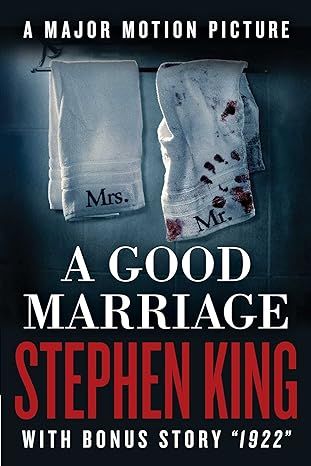
A Good Marriage
4.1
-
5,995
$4.99
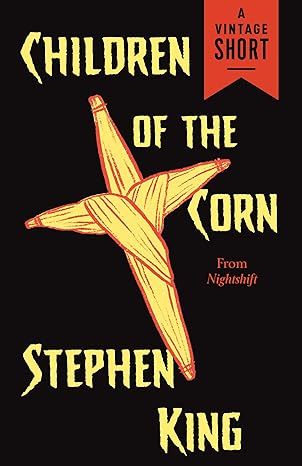
Children of the Corn (Kindle Single) (A Vintage Short)
4.3
-
1,084
$0.99
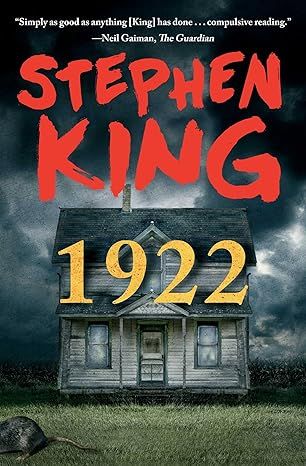
1922
4.6
-
6,082
$7.99
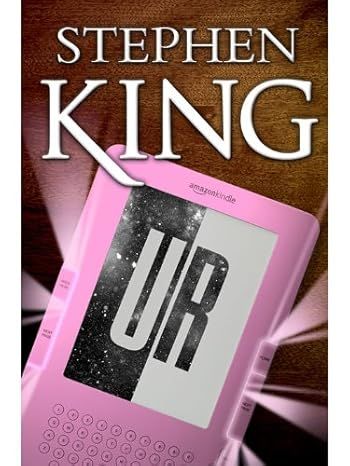
UR
4.3
-
6,140
$3.99
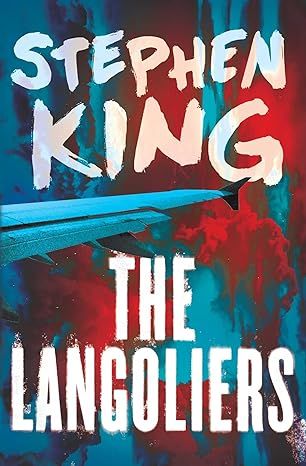
The Langoliers
4.6
-
1,014
$6.49

The Girl Who Loved Tom Gordon: A Novel
4.5
-
4,774
$1.17
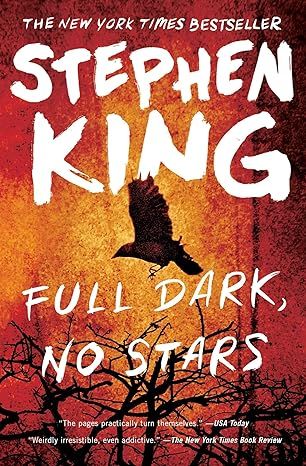
Full Dark, No Stars
4.6
-
6,762
$5.00

Gwendy's Button Box: A Novella (Gwendy's Button Box Trilogy Book 1)
4.5
-
21,335
$3.88
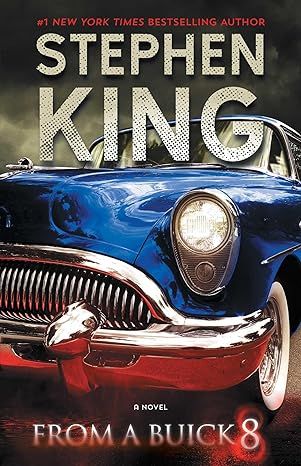
From a Buick 8: A Novel
4.3
-
2,174
$11.99
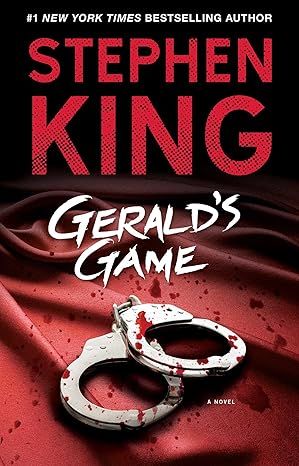
Gerald's Game
4.2
-
3,838
$1.97
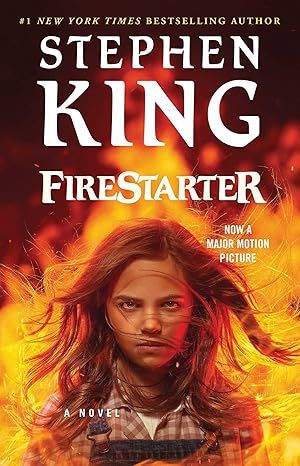
Firestarter
4.6
-
5,489
$9.99
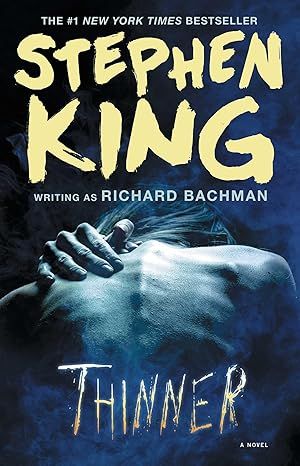
Thinner
4.5
-
3,107
$2.50
Best Sellers
View all
The Tuscan Child
4.2
-
100,022
$8.39

The Thursday Murder Club: A Novel (A Thursday Murder Club Mystery)
4.3
-
155,575
$6.33

Sapiens: A Brief History of Humankind
4.6
-
140,302
$13.49

The Butterfly Garden (The Collector, 1)
4.3
-
88,556
$9.59

Things We Hide from the Light (Knockemout Series, 2)
4.4
-
94,890
$11.66

The Last Thing He Told Me: A Novel
4.3
-
154,085
$2.99

The Perfect Marriage: A Completely Gripping Psychological Suspense
4.3
-
143,196
$9.47

The Coworker
4.1
-
80,003
$13.48

First Lie Wins: A Novel (Random House Large Print)
4.3
-
54,062
$14.99

Mile High (Windy City Series Book 1)
4.4
-
59,745
$16.19

Layla
4.2
-
107,613
$8.99

The Locked Door
4.4
-
94,673
$8.53
